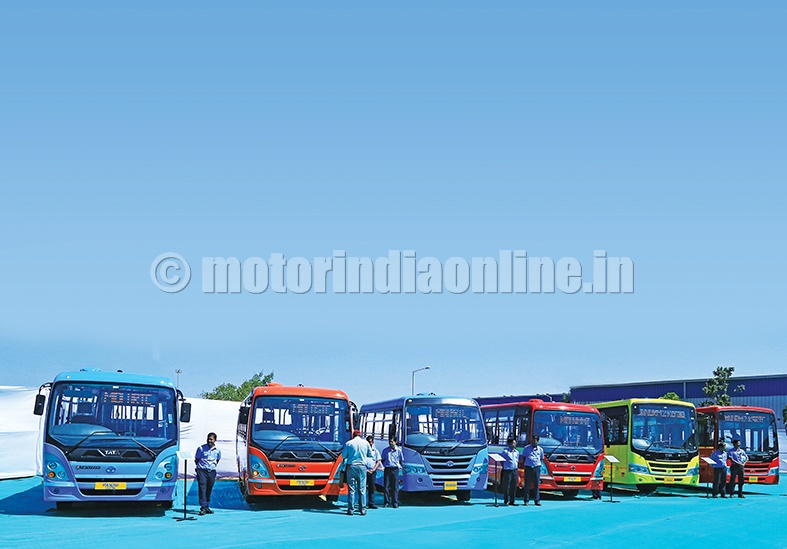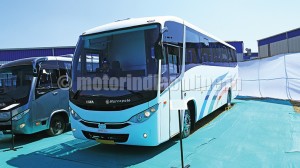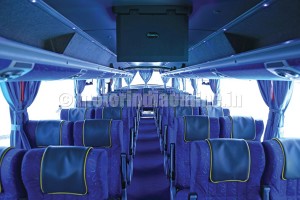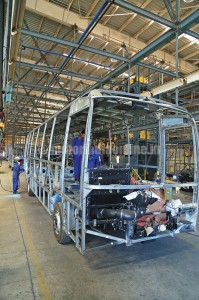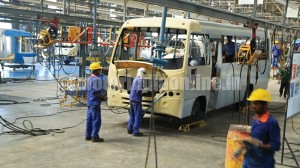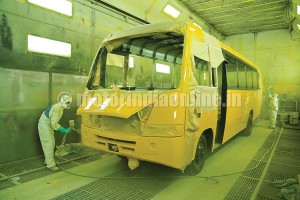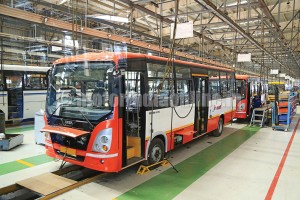New Magna luxury coach to be launched
The Indian bus market is rapidly evolving from the bus body on truck chassis configuration to fully-built buses which are leagues ahead when it comes to performance, safety, comfort and connectivity and other aspects. The country saw a major turning point in this regard in 2006 when one of the most important joint ventures in the Indian bus industry history was inked between home-grown pioneer Tata Motors and the Brazilian bus and coach major Marcopolo S.A. to form Tata Marcopolo Motors Ltd. (TMML). Within a decade, the Indo-Brazilian JV has delivered over 70,000 buses in India and abroad as it continues to drive growth in the domestic market. We got an opportunity to visit the TMML facility at Dharwad, which is also its headquarters, and interact with senior officials who shared details on recent developments at the company and its plans for the future.
Through the JV, TMML has acquired skills of product innovation, process innovation introducing world-class buses, with the most relevant global technologies. The advanced engineering and design facility with automated machine shops at TMML delivers accurate dimensions of bus parts, with a focus on developing world-class buses. Tata Marcopolo’s Dharwad plant has an installed capacity of 15,000 buses per annum while its plant at Lucknow has a capacity of 3,000 buses per annum, with a workforce of over 3,000 people.
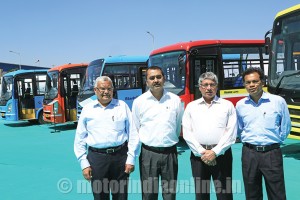
New luxury coach
The most recent development at TMML is the new 12 m luxury intercity coach Magna which is a reflection of the company’s effort to take on the global heavyweights who have been dominating the segment. With the Magna, Tata Marcopolo is also trying to bridge the gap between the performance (value) and luxury segments by offering an attractive and feature-rich proposition at costs significantly lower than the premium space.
Says Mr. R. Ramakrishnan, Senior VP, CVBU, Tata Motors: “With the new Magna coach we would like to redefine luxury and offer a different value to our customers than what is currently available in the luxury segment. We are also trying to blur the gap between the premium and the performance-sensitive segments with the Magna, by which we will expand the latter segment with a better value-proposition for customers.” While the Magna will also be available in a 7.5 m variant, another of Tata Marcopolo’s much-awaited product in the premium segment – the Paradiso coach – is slated for market launch sometime next year.
TMML also continues to expand its presence in the middle segment of the market which it expects to grow significantly in the coming years. “Since we began our fully-built vehicle activity with Tata Marcopolo, we have expanded our presence in the middle portion of the market which is balanced between the price-sensitive segment and the premium space. We have been very successful with our Starbus range and are taking it to the next level with the Starbus Ultra platform. In the price-sensitive segment, we are increasing our focus on the Cityride because we find a large portion of the market is still very interested in this segment”, adds Mr. Ramakrishnan.
JnNurm orders
Tata Marcopolo has bagged an order of around 3,500 buses under JnNurm phase II and is currently delivering the vehicles to the STUs. The company has emerged the preferred choice of various STUs in the country including Navi Mumbai Municipal Transport (NMMT), Himachal State Road Transport Corporation (HRTC), Karnataka State Road Transport Corporation (KSRTC), and Assam State Transport Corporation (ASTC), among others.
The JnNurm scheme has been instrumental in driving the growth of fully-built buses in the country with the currently active second scheme further raising the bar in terms of quality, comfort, safety and connectivity from the first phase which was executed around seven years ago.
“The standard of buses built under JnNurm’s UBD II specifications is a lot different than what we typically see as government buses. These buses greatly enhance the appeal of public transport and also make the cities look better. In terms of safety and comfort, these are leagues away from the standard buses and are even better than those built under JnNurm I”, he states.
Focus on FBVs
Tata Motors entered the fully-built bus space with the launch of its CityRide model back in 2004. The company’s FBV bus business received a further thrust following the establishment of TMML in 2006 which has resulted in its share of fully-built buses going up to nearly half of its overall bus sales volume. The share of FBV buses hovers around 70 per cent of its LCVs sales and is somewhat similar in the ICV segment too, mainly driven by the school and staff transportation segments.
The only segment which continues to offer considerable resistance towards shifting to FBVs is the tours and travels sector due to the high levels of customization demanded by customers and the also the difference in taxation structure between the organized and unorganized sectors, which results in the latter being 30-35 per cent less expensive than the former owing to absence of excise and sales taxes.
“We hope that with the bus body code in place, a level playing field in terms of taxation structure and other changes, the situation in the market would soon get better. Tata Motors is fully-equipped through our Tata Marcopolo and ACGL subsidiaries to fully cater to the country’s needs of completely-built, safe and comfortable buses in the coming years”, he adds with confidence.
TMML remains committed to quality and superior designs, delivering optimized FBV solutions for best vehicle performance, high level of customization & best-in-class comfort for passengers. With the capability to manufacture the smallest 12 seater bus ranging to a 72 seater bus on the same assembly line, Tata Marcopolo successfully caters to customizations requested by its clients. Besides customized buses, TMML has over 70 standard variants which keep increasing every year. Tata Marcopolo bus models are duly tested for bus body performance & reliability under the bus body code, basis stringent test procedures both at a component level and fully built bus level. They are also homologated through the Automotive Research Authority of India (ARAI).
When asked whether TMML would consider offering shells for customized bus body building, Mr. Rohit Srivastava, CEO, Tata Marcopolo, says: “Fully-built buses will become the name of the game in future, so we might not give shells to customers as it would again become kind of unorganized. The intricacies in modern buses will call for a thorough design and development approach, which will force the increase in share of FBVs in the market.”
Future plans
As we enter a new financial year, Tata Marcopolo is keen on continuing its strong market position by clocking good numbers while it also plans to step up focus on hybrid mobility. “We will be working around 13,000 to 14,000 units this financial year and can expand our capacity depending on market requirements. In terms of sustainable mobility, we have hybrids that are powered by regenerative braking and do not require additional external infrastructure. We have series and parallel hybrids running on CNG and diesel and are also working on electric vehicles and fuel cells. We believe hybrid to be the first choice because it does not require any additional investment. We have delivered 10 hybrids in Spain which have run successfully for over 4 lakh km. We are now looking at the Indian market for these vehicles”, reveals Mr. Srivastava.
Tata Marcopolo’s JnNurm II customers include:
• Navi Mumbai Municipal Transport (NMMT)
• Himachal State Road Transport Corporation (HRTC)
• Assam State Transport Corporation (ASTC)
• Karnataka State Road Transport Corporation (KSRTC)
• Puducherry Road Transport Corporation Ltd. (PRTC)
• Kerala State Road Transport Corporation (KESRTC)
